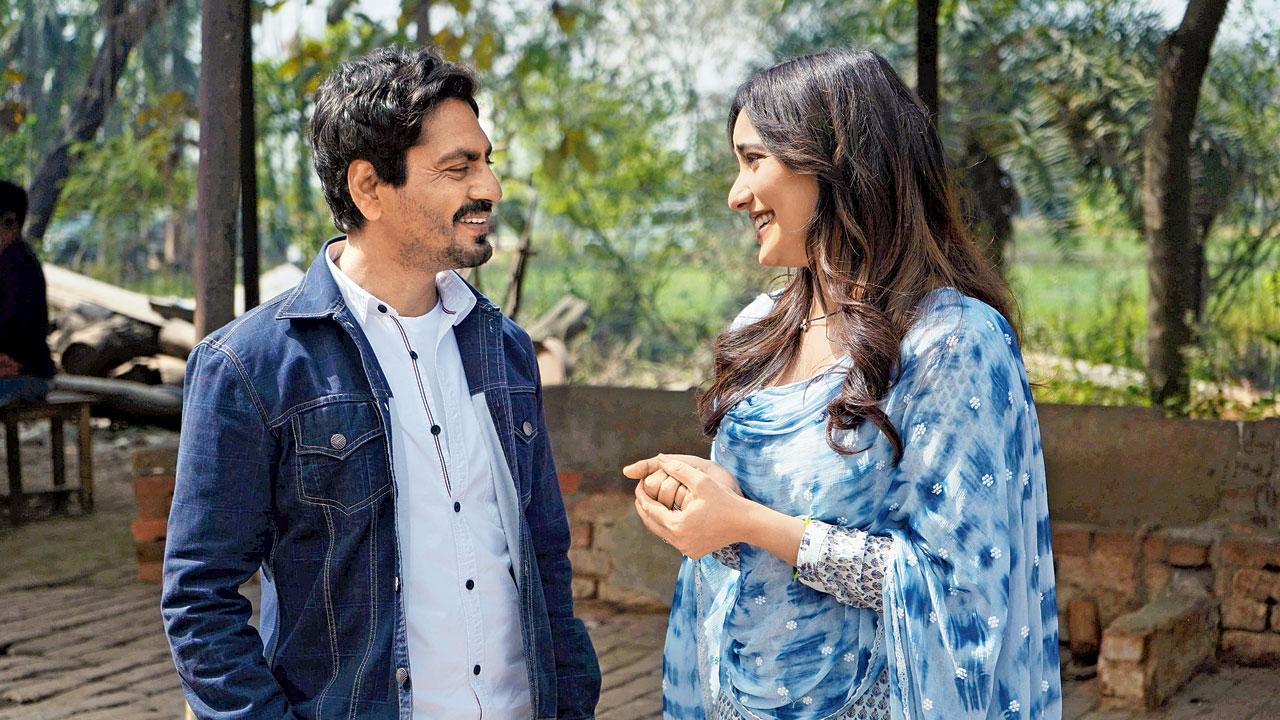Jogira Sara Ra Ra, pointlessly titled after the famous Holi refrain, is a North Indian small-town picture. Made for the North Indian small-town audience. If you know what I mean. No, you don’t?

Jogira SaRa Ra Ra
Jogira SaRa Ra Ra
U/A: Comedy, Drama
Dir: Kushan Nandy
Cast: Nawazuddin Siddiqui, Neha Sharma
Rating: 2/5
ADVERTISEMENT
An insight this film gets right is that you can be incredibly useful to Indian society, if you work in the Indian Railways: “to confirm tickets”! Upper-classes barely have to suffer what it means to score a rail ticket in this country. There’s a guy here, who holds a “permanent, government” job in the railways. That’s top of the food chain, really.
Only that he’s such a ‘chomu’/chump in life, dressed in checked shirts and hanging trousers, tying his scooter up with a chain, when he parks on the street — and generally the typical bore, like a small-town version of Subodh from Dil Chahta Hai — that it’s unlikely he’ll ever score a girl for himself.
Parents come to the rescue of such Indian men. He’s up for marrying a girl (Neha Sharma), who’s way out of his league, hence. Where have I seen this actor before? It occurred to me who he was, only in a scene, where he’s moving to the steps of the song, ‘I am a disco dancer’. And one of the characters quips, “Look at him dancing as if it’s his father’s song!”
Oh, so it is his father’s song, and that’s Mithun’s son, Mimoh — whose glorious debut, Jimmy (2008), I may be the only person in the world to remember from its maiden/premiere screening, that also instantly sank his potential career. Mimoh has reappeared as the opposite of a hero in this pic.
Obviously, the heroine is least interested in marrying him. There’s an event planner (Nawazuddin Siddiqui) she kinda hires to annul this inauspicious union. That is, carefully plan and effect a break-up, basically. This fellow is the film’s hero, and also a commitment-phobe, when it comes to romance himself.
Now, where have I seen the same premise play out? The rom-com, starring Ranbir Kapoor recently, Tu Jhoothi Mein Makkaar (2023). Are the two movies similar then? Hell, no. Jogira Sara Ra Ra, pointlessly titled after the famous Holi refrain, is a North Indian small-town picture. Made for the North Indian small-town audience. If you know what I mean. No, you don’t?
Okay, so essentially about a place, where the greatest object of male shame/embarrassment is to go to a pharmacy and ask for a sanitary napkin. Which is significantly worse that buying a condom! And you’d dig a hole and die inside it, if you had to pick up a pregnancy test. That’s where the humour emerges from. There is then a lot of daatun (neem sticks to brush teeth), bidi, carrom, and two-in-one tape recorder, in a world of smart phones. And, of course, huge families.
In this case, a large retinue of unmarried girls in a house-hold, along the lines of, say, Raksha Bandhan (2022), which was also the last time actor Akshay Kumar attempted to engage with the same audience. And yes, since this is, after all, a movie set in Uttar Pradesh — Bareilly, Lucknow, Banāras, etc — reputably the capital of India’s K&R (kidnapping and random) industry: How can there not be the gangs and the goons, the police and the chors?
You can kinda make sense of what the filmmakers are trying to do here, with Yadav & Yadav, like Thomson & Thomson, for cops. A Chacha Chaudhary (Sanjay Mishra) for a chilled-out gangster. That’s the game. The genre is loud, ‘time-pass’ comedy. Meaning, a gag a minute, scripted by Ghalib Asad Bhopali. Nawaz is supposed to deliver the laughs. In his theatre days, Nawaz says, he was widely known for a very “bhondu wali” comedy.
That’s what’s expected of him here. In some portions, he pulls it off fine too. Even as the self-referential dialogue refers to his “baap ka dada ka” line from the intense Gangs of Wasseypur. Frankly, this is the kinda movie that makes you miss someone like a bum-phod Govinda, who hasn’t been replaced on the Hindi screen still. For Nawaz, a film of this sort merely adds to his range.
But the slot of that super-funny hero — capable of casually overdoing bawdy humour, with mad body-language, and throwaway lines, winging it by just being there — remains vacant still. Which means one has to rely entirely on the jokes for the tickle here. To be fair, blokes in my theatre were hitting LOL, ROFL levels, on occasion — while I sat there quietly wondering, WTF is so funny!
All opinion on such matters is subject to market risks. Given how subjective such humour can be. There are fragments of fun, surely. Naah, going nowhere with it, though.
Also Read: 'Bheed' movie review: That long walk of shame
 Subscribe today by clicking the link and stay updated with the latest news!" Click here!
Subscribe today by clicking the link and stay updated with the latest news!" Click here!







